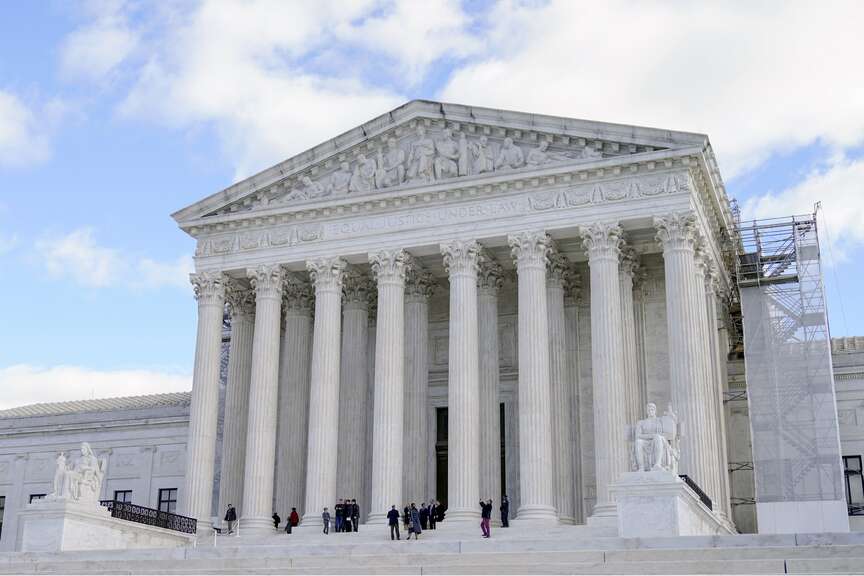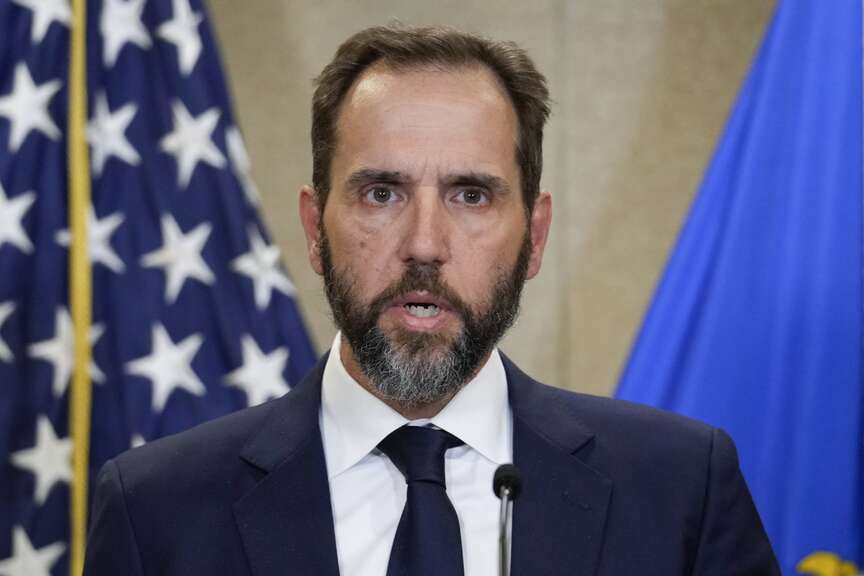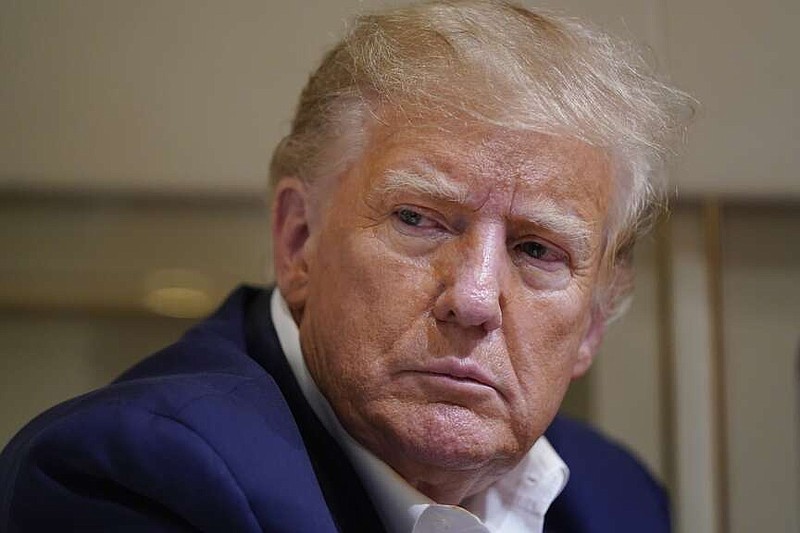WASHINGTON -- The Supreme Court said Friday it will not immediately take up a plea by special counsel Jack Smith to rule on whether former President Donald Trump can be prosecuted for his actions to overturn the 2020 election results.
The ruling is a scheduling win for Trump and his lawyers, who have sought repeatedly to delay the criminal cases against him as he campaigns to reclaim the White House in 2024. It averts a swift ruling from the nation's highest court that could have definitively turned aside his claims of immunity, and it further throws into doubt the possibility of the landmark trial proceeding as scheduled on March 4.
The issue will now be decided by the U.S. Court of Appeals for the District of Columbia Circuit, which has signaled it will act quickly to decide the case.
The case will be heard by a three-member panel made up of Judge Karen Henderson, who was appointed by President George H.W. Bush, and Judges Florence Pan and J. Michelle Childs, who were both appointed by President Joe Biden.
Smith had cautioned that even a rapid appellate decision might not get to the Supreme Court in time for review and final word before the court's traditional summer break.
The special counsel had argued that since only the Supreme Court can definitively answer the question of a chief executive's immunity for actions taken while in office, the justices should act now.
"Whether a former President of the United States enjoys absolute immunity from criminal prosecution for a conspiracy to overturn an election, and thereby prevent the lawful winner from taking office, is an issue of great constitutional moment," Smith said in his filing. "This Court's immediate review of that question is the only way to achieve its timely and definitive resolution."
Smith had pressed the Supreme Court to intervene, citing significant public interest in a prompt resolution to the case. The request to leapfrog the appeals court, which Smith acknowledged was "extraordinary," also underscored prosecutors' concerns that the fight over the issue could delay the start of Trump's trial beyond next year's presidential election.
The justices turned down Smith's request in a single-sentence order Friday. As is customary, the court gave no explanation for the decision.
[DOCUMENT: Read the court's one-sentence order » arkansasonline.com/1223usvtrump/]
With the justices remaining out of the dispute for now, additional appeals are likely that could delay the case. If the appeals court, which is set to hear arguments on Jan. 9, turns down Trump's immunity claims, he could then ask for the Supreme Court to get involved -- giving the justices another opportunity to decide if they want to weigh in.
U.S. District Judge Tanya Chutkan has already put the case on hold while Trump pursues his claim that he is immune from prosecution. Chutkan has raised the possibility of keeping the March trial date if the case promptly returns to her court.
She earlier rejected the Trump team's arguments that an ex-president could not be prosecuted over acts that fall within the official duties of the job.
"Former presidents enjoy no special conditions on their federal criminal liability," Chutkan wrote in a Dec. 1 ruling. "Defendant may be subject to federal investigation, indictment, prosecution, conviction, and punishment for any criminal acts undertaken while in office."
In his filing to the Supreme Court, Smith said, "This case involves -- for the first time in our Nation's history -- criminal charges against a former President based on his actions while in office. And not just any actions: alleged acts to perpetuate himself in power by frustrating the constitutionally prescribed process for certifying the lawful winner of an election."
Trump's lawyers told the justices that the issue was too important to be rushed, and that Smith, by seeking to hasten the timetable, is doing the bidding of Biden's reelection campaign.
Smith "confuses the 'public interest' with the manifest partisan interest in ensuring that President Trump will be subjected to a months-long criminal trial at the height of a presidential campaign where he is the leading candidate and the only serious opponent of the current Administration," Trump lawyer D. John Sauer wrote.
Trump responded to the court's action in a statement that reiterated his claims that he -- rather than Biden -- won three years ago. "Of course I am entitled to Presidential Immunity," he wrote on his social media site Truth Social. "I was President, it was my right and duty to investigate, and speak on, the rigged and stolen 2020 Presidential Election. Looking forward to the very important arguments on Presidential Immunity in front of the DC Circuit Court of Appeals."
Any significant delays could plunge the trial into the heart of the 2024 campaign season or push it past the election, when Trump could order that the charges be dropped if he wins the presidency.
There are still more Trump-related cases that the Supreme Court, which includes three justices appointed by him, is poised to decide.
Trump's lawyers plan to ask the court to overturn a decision by the Colorado Supreme Court barring him from that state's ballot under Section 3 of the 14th Amendment, which prohibits anyone who swore an oath to support the Constitution and then "engaged in insurrection" against it from holding office.
And the court separately has agreed to hear a case over the charge of obstruction of an official proceeding that has been brought against Trump and more than 300 of his supporters who stormed the Capitol on Jan. 6, 2021.
In the current immunity case, Smith had tried to persuade the justices to take up the matter directly, bypassing the appeals court.
"This case presents a fundamental question at the heart of our democracy: whether a former president is absolutely immune from federal prosecution for crimes committed while in office or is constitutionally protected from federal prosecution when he has been impeached but not convicted before the criminal proceedings begin," prosecutors wrote.
Underscoring the urgency for prosecutors, Smith and his team wrote: "It is of imperative public importance that respondent's claims of immunity be resolved by this Court and that respondent's trial proceed as promptly as possible if his claim of immunity is rejected."
Trump's lawyers have for months signaled that they would ultimately ask the Supreme Court to take up the immunity question. But they urged the justices this week to stand down for now, saying there was no reason to rush a decision.
"Importance does not automatically necessitate speed. If anything, the opposite is usually true. Novel, complex, sensitive and historic issues -- such as the existence of presidential immunity from criminal prosecution for official acts -- call for more careful deliberation, not less," Trump's lawyers wrote.
Justice Department policy prohibits the indictment of a sitting president. Though there's no such bar against prosecution for a former commander in chief, lawyers for Trump say that he cannot be charged for actions that fell within his official duties as president -- a claim that prosecutors have vigorously rejected.
Trump faces charges accusing him of working to overturn the results of the 2020 election he lost to Democrat Joe Biden before the violent riot at the Capitol. He has denied any wrongdoing.
The high court still could act quickly once the appeals court issues its decision. A Supreme Court case usually lasts several months, but on rare occasions, the justices shift into high gear.
Nearly 50 years ago, the justices acted within two months of being asked to force President Richard Nixon to turn over Oval Office recordings in the Watergate scandal. The tapes were then used later in 1974 in the corruption prosecutions of Nixon's former aides.
It took the high court just a few days to effectively decide the 2000 presidential election for Republican George W. Bush over Democrat Al Gore.
Trump has also been charged by Smith with illegally hoarding classified documents at his Mar-a-Lago estate, a case set for trial next May, and is accused by state prosecutors in Georgia of scheming to subvert that state's presidential election and in New York in connection with a hush money payment to a porn actress.
Information for this article was contributed by Mark Sherman, Eric Tucker and Lindsay Whitehurst of The Associated Press; Robert Barnes and Perry Stein of The Washington Post; and Adam Liptak of The New York Times.
 FILE - The Supreme Court is shown in Washington, Monday, Dec. 18, 2023. The Supreme Court said Friday, Dec. 22, that it will not immediately take up a plea by special counsel Jack Smith to rule on whether former President Donald Trump can be prosecuted for his actions to overturn the 2020 election results. (AP Photo/Mariam Zuhaib, File)
FILE - The Supreme Court is shown in Washington, Monday, Dec. 18, 2023. The Supreme Court said Friday, Dec. 22, that it will not immediately take up a plea by special counsel Jack Smith to rule on whether former President Donald Trump can be prosecuted for his actions to overturn the 2020 election results. (AP Photo/Mariam Zuhaib, File) FILE - Special counsel Jack Smith speaks to the media about an indictment of former President Donald Trump, Aug. 1, 2023, at an office of the Department of Justice in Washington. The Supreme Court said Friday, Dec. 22, that it will not immediately take up a plea by special counsel Jack Smith to rule on whether former President Donald Trump can be prosecuted for his actions to overturn the 2020 election results. (AP Photo/J. Scott Applewhite, File)
FILE - Special counsel Jack Smith speaks to the media about an indictment of former President Donald Trump, Aug. 1, 2023, at an office of the Department of Justice in Washington. The Supreme Court said Friday, Dec. 22, that it will not immediately take up a plea by special counsel Jack Smith to rule on whether former President Donald Trump can be prosecuted for his actions to overturn the 2020 election results. (AP Photo/J. Scott Applewhite, File)
